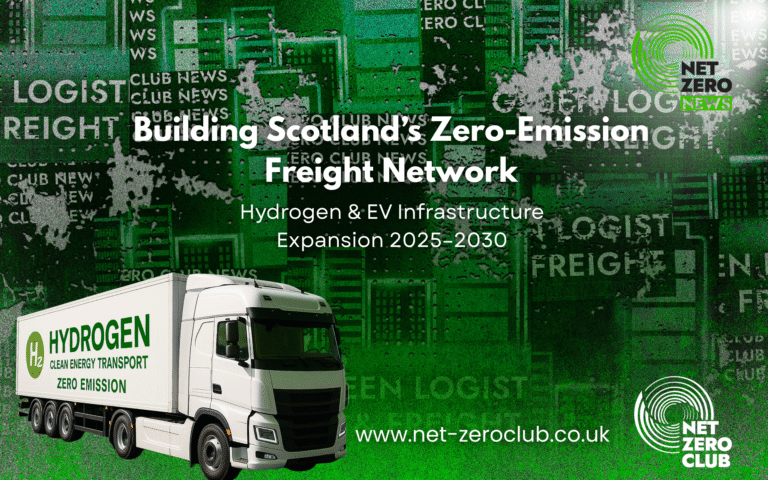Shell Unveils EV Charging Network for Heavy-Duty Fleets

Welcome, Net Zero News readers,
In a significant stride towards sustainable transport, Shell has unveiled its innovative integrated electric vehicle (EV) charging network tailored specifically for heavy-duty fleets. This ambitious initiative is set to deliver a shared infrastructure model, aimed at accelerating the electrification of fleets across Europe.
The integrated network combines several critical components, including Shell Recharge sites, roaming partner locations, semi-public depot sites, and private charging points. By enabling controlled third-party access to this comprehensive network, Shell is addressing a pressing need within the industry for robust EV infrastructure.
As businesses with heavy-duty fleets face substantial challenges related to infrastructure gaps and high investment costs, Shell’s initiative is poised to provide much-needed support. The company recognises that the transition to electrification can be daunting, and they are committed to easing this journey for fleet operators.
Shell’s subsidiary, SBRS, is at the forefront of delivering the depot-based elements of this shared network. They are responsible for the provision of essential services, including the deployment of charging hardware, software integration, and comprehensive energy system support. This concerted effort is aimed at creating a seamless experience for fleet operators looking to transition to electric vehicles.
Among the key features of this integrated charging network are tailored charging solutions designed to enhance operational efficiency. Fleet operators can anticipate energy savings of up to 30%, allowing them to electrify their operations without the burden of significant depot investments. Furthermore, the network promises stable pricing, an essential factor in managing the costs associated with fleet electrification.
Shell’s proactive approach is a timely response to the myriad challenges that heavy-duty fleet operators face, particularly in terms of managing costs, complexity, and operational efficiency. The current landscape is characterised by fragmented networks and inconsistent energy prices that can hinder performance. By addressing these issues, Shell is making strides towards creating a more cohesive and efficient charging ecosystem.
Moreover, the company emphasises the need for the industry to “connect the dots” by integrating hardware, software, and energy supply into one optimised network. This holistic approach will not only streamline operations but also maximise asset utilisation, opening new avenues for reducing the total cost of ownership while facilitating the transition to battery-electric transport.
Conrad Mummert, Head of SBRS at Shell, articulated the significance of this integrated charging network, stating, “Our integrated charging network supports fleet operators by providing dependable access and helps to reduce the total cost of ownership for battery-electric trucks by up to 25%.”
He further elaborated that this reduction is achieved through a combination of cost-saving measures and revenue-generating opportunities. These include stable, discounted energy pricing, charging optimisation, and the potential for monetising depot access during off-peak hours, creating a win-win scenario for fleet operators.
The collaborative efforts extend beyond Shell, with partners such as Contargo playing a pivotal role in this electrification journey. Kristin Kahl, from Management Sustainable Solutions at Contargo, highlighted the importance of integration in fleet operations: “We truly value our collaboration with SBRS. Fleet electrification only works when charging is fully integrated into daily operations, which is why we’ve combined different models across our network.”
Contargo is planning a significant rollout, with 90 electric trucks and an equal number of charging points expected to be operational by the end of the year. Kahl noted, “We’re observing how integrated infrastructure can support scaling up and contribute to reducing emissions in logistics operations.”
This pioneering initiative by Shell not only addresses the immediate needs of heavy-duty fleet operators but also sets a precedent for future developments in the EV charging landscape. As the industry evolves, the integration of advanced technologies and sustainable practices will be crucial in driving the transition towards a greener future.
In conclusion, Shell’s integrated electric vehicle charging network for heavy-duty fleets represents a significant advancement in the quest for sustainable transport solutions. By providing a comprehensive and accessible charging infrastructure, Shell is empowering fleet operators to embrace electrification while reducing their overall costs. As we move forward, the collaboration between industry leaders and the implementation of innovative solutions will be essential in achieving our collective goal of net-zero emissions.
Stay tuned for more updates from the forefront of sustainability and electrification in the transport sector. Together, we can champion a greener future!
Images courtesy of Shell

 Got net-zero news, project updates, or product launches to share?
Got net-zero news, project updates, or product launches to share? 
